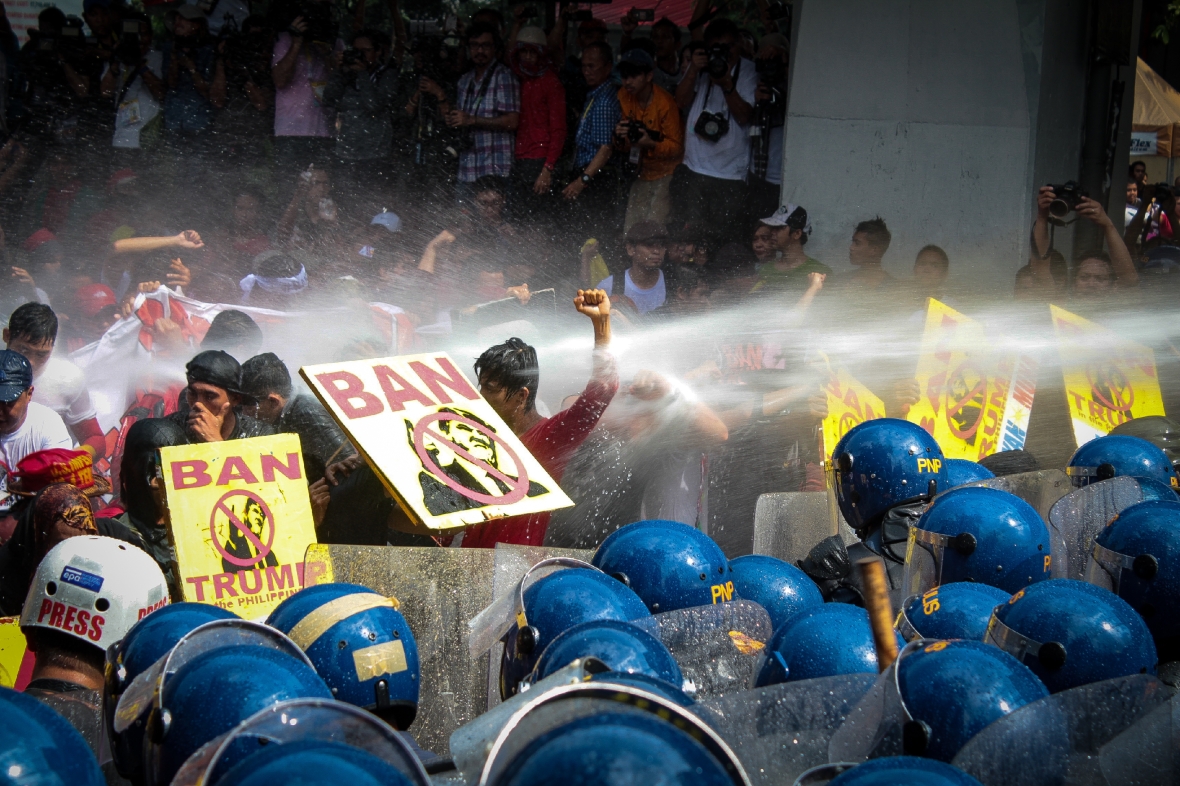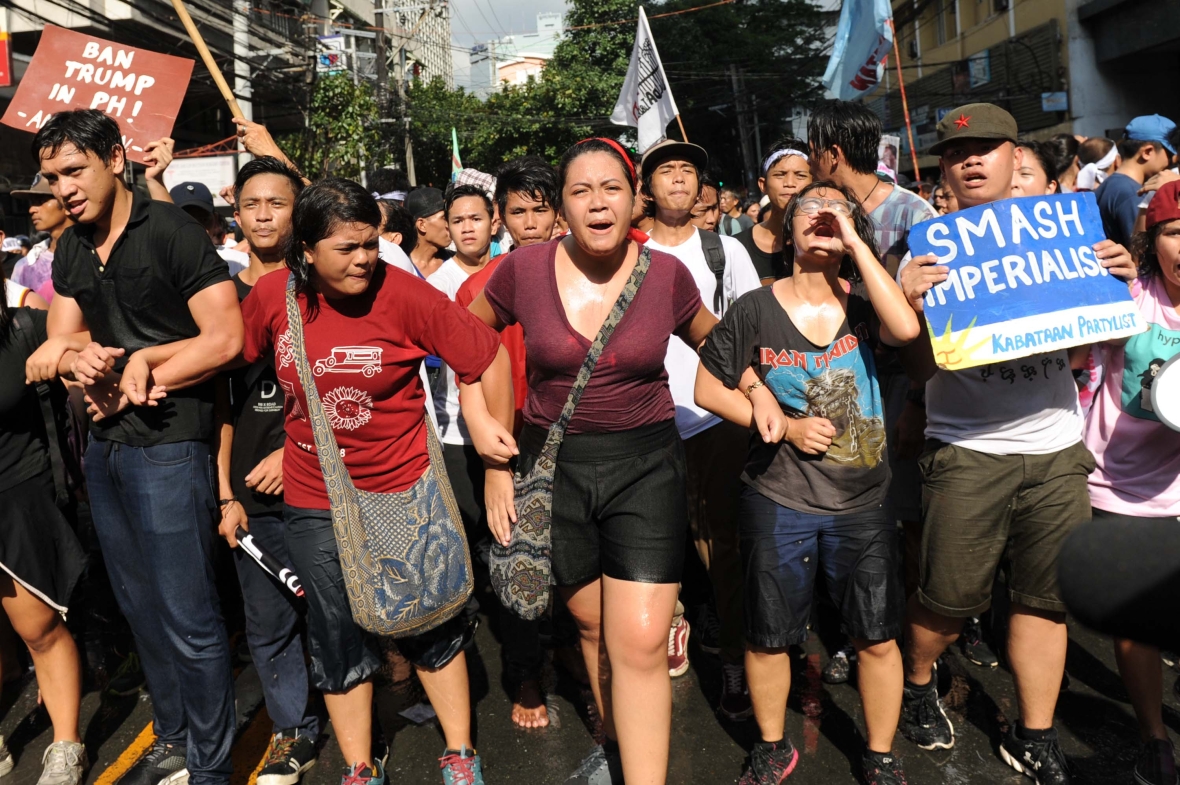The Association of Southeast Asian Nations (ASEAN) Summit, held on 12-14 November 2017 in Manila, Philippines, was attended by delegations from nine ASEAN member countries and leaders of 11 other nations including United States president Donald Trump, European Council president Donald Tusk, Chinese premier Li Keqiang, Japanese prime minister Shinzo Abe and Canadian prime minister Justin Trudeau.
The Summit covered different issues that affected the Southeast Asian region, but the presence of Donald Trump and the leaders of the world’s major economies meant that neoliberal economic policies were high on the summit’s agenda. The talks also included peace and security issues, including the American US “war on terror” that has seen millions of people killed and tens of millions more displaced.
As the region’s leaders, including the Philippines’ own president Rodrigo Duterte, kowtowed to the wants of world leaders desperate for the regions resources, protest actions were launched to show the people’s opposition to further economic plunder and militarism that will only serve as added burdens for the region’s long-suffering peoples.

The US “war on terror” is actually seen in many parts of the world as sponsoring State terrorism against peoples resisting further oppression and exploitation. (Photo: Neil Ambion/Lente)

Imperialism has always meant war, and nothing illustrates this more than the US’ involvement in several wars all over the world directly or indirectly, all in the name of “national security” and protecting its own interests to the detriment of other peoples and nations. (Photo: Neil Ambion/Lente)

To implement imperialist policies, Trump and the US elite have always had to use fascist policies and methods in order to silence the people’s opposition to their rule. (Photo: Mark Saludes/Lente)

In the Philippines, president Rodrigo Duterte has followed the steps of Donald Trump by implementing extrajudicial killings and canceling the peace talks with the National Democratic Front of the Philippines, which would have ended 49 years of Maoist revolution in the country. (Photo: Mark Ambay III/Lente)

In response to protest actions mounted by people’s movements in the Philippines, Duterte’s government showed its true colors by violently dispersing rallies which aimed to show the negative effects of neoliberalism and militarism on the Filipino people. (Photo: Mark Saludes/Lente)

History has proven that Philippine leaders and security forces have always been subservient to foreign interests, and this is highlighted by the readiness of Philippine security forces to disperse people’s actions at a moment’s notice. (Photo: Neil Ambion/Lente)

While the Asean Summit was taking place, farmers organizations launched an action to occupy Hacienda Luisita, which is owned by the powerful Cojuangco family. In rural areas in the Philippines, majority of arable land is controlled by a few elite families. Land redistribution and agrarian reform, which is one of the prerequisites for industrialization, is not implemented by the Philippine government, thus serving the neoliberal economic agenda of foreign powers. (Photo: Emmanuel Halabaso/Lente)

Land rights movements, however, have slowly been gaining strength in occupying land meant for distribution and have had several recent successes, including occupying a portion of Hacienda Luisita. (Photo: Emmanuel Halabaso/Lente)

Back in Manila, protest actions against Donald Trump, US imperialism and neoliberal policies continued unabated. Security forces also continued to prevent protesters from continuing their actions. (Photo: Efren Ricalde/Lente)

As protesters stood their ground, Philippine security forces used water cannons and even a Long Range Audio Device in order to disperse them. (Photo: Neil Ambion/Lente)

And despite being violently dispersed and hurt, protesters courageously continued holding their ground. (Photo: Efren Ricalde/Lente)

Protesters continued to regroup and march against Trump, US imperialism and the neoliberal economic agenda despite being violently dispersed. (Photo: Efren Ricalde/Lente)

Protesters also called for US troops to leave the country. US troops arrived in the Philippines upon the invitation of the Philippine military supposedly to help in the fight against the ISIS-backed war led by the Maute group in the southern Islamic City of Marawi. The war has killed hundreds and displaced over 500,000 people. (Photo: Mark Ambay III/Lente)

Women human rights defenders were also part of the protest actions to ban Trump in the Philippines. Women, especially those from the working class, bear the brunt of the effect of neoliberal economic policies on their livelihoods. (Photo: Efren Ricalde/Lente)

Indigenous peoples are also gravely affected by imperialism and neoliberal economic policies, especially since it is their ancestral lands that are the prime targets for environmental plunder because of their rich natural resources. Indigenous peoples in the Philippines continue to be killed and harassed by the Philippine military and paramilitary forces in order to weaken their opposition to encroachment of big foreign companies on their land. (Photo: Emmanuel Halabaso/Lente)

The Filipino youth are most especially active in the struggle against imperialism and neoliberal policies. (Photo: Efren Ricalde/Lente)

Back in Hacienda Luisita, farmers continued to stand firm in their occupation of land that rightfully belonged to them. (Photo: Emmanuel Halabaso/Lente)

In Manila, the seething anger of the people’s protest burns Donald Trump to the ground. (Photo: Mark Saludes/Lente)

Protesters also showed their rage against US imperialism in Manila. (Photo: Efren Ricalde/Lente)

People’s movements have always been at the forefront in the fight for social justice and equity. Because it has also always been a fight for a better world for the next generation. (Photo: Efren Ricalde/Lente)